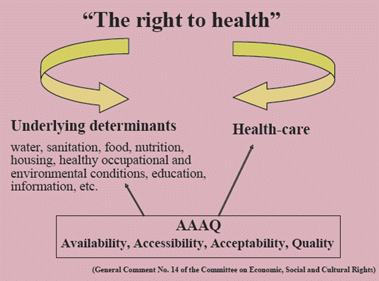
Health is vitally important for every human being in the world. What ever our differences may be, health is our most important commodity. A person in bad health cannot really live life to the fullest.
The principle characteristics of the right to health
Health is the state of physical, mental and social well-being and does not only mean an absence of illness or disease.
The right to health is closely linked to other fundamental human rights, most notably access to potable water and adequate hygiene.
The right to health includes access to health services
All children have the right to timely access to appropriate health services. This requires the establishment of a system to protect health, including access to essential medicine.
The realization of the right to health implies that each country will put in place health services that are available in any circumstance, accessible to everyone, of good quality and satisfactory (meaning they conform to medical ethics and are respectful of our biological and cultural differences.)
However, this does not mean that the country must guarantee good health to everyone. (see also: Distinction between the right to health and the right to good health)
The right to health also involves prevention and awareness campaigns
Prevention plays an essential role in maintaining public health, particularly children’s health. Health education and vaccinations prevent the spread of infectious disease.
Vaccinations are efficient because they are fairly inexpensive and they protect children against the risk of death and handicaps caused by the most common children’s diseases (tuberculosis, diphtheria, tetanus, leprosy, polio, whooping cough, measles.) In the long term, these vaccinations can even lead to the end of these diseases in a given country.
Vaccinating children, as well as awareness campaigns, can lead to a significant reduction in health risks. Additionally, spreading basic information about hygiene, nutritional needs, etc., as well as the circulation of simple illustrations reminding people of the fundamental rules are very efficient actions for informing populations and improving healthy behavior.
Additionally, it is important to inform the population about the harmful effects that child marriage or Female genital mutilation have on children’s health.
Children’s right to health
For children, the right to health is vital because they are vulnerable beings, more at risk to illness and health complications. When children are spared from disease, they can grow into healthy adults, and in this way, contribute to the development of dynamic and productive societies.
The right for children to enjoy the best possible state of health
Children require extra attention in order to enjoy the best possible health. This allows them to develop properly during their childhood and teenage years.
At every step of their physical and mental development, children have specific needs and different health risks. Additionally, a newborn is more vulnerable and more exposed to certain diseases than a young child or teenager (i.e. infectious disease, malnutrition.)
On the other hand, a teenager, due to his or her habits and behavior, are exposed to other kinds of risks (sexual health, mental health, alcohol and drug use etc.)
Generally, a child who benefits from appropriate health care will enjoy a better state of health during the stages of childhood and can become a healthy adult.
Pre and Postnatal Health care.
The right to children’s health also includes pre and postnatal care for mothers.
A newborn will have a much lower chance of survival if the mother dies due to complications from pregnancy or childbirth.
Source: Humanium
 FR
FR EN
EN AR
AR








